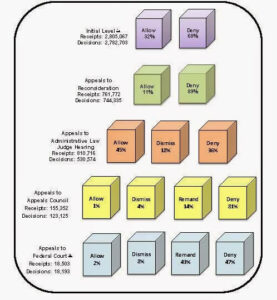
Claimants who file for Social Security Disability benefits have physical impairments, mental impairments, or a combination of both. The claimant will testify at a hearing about the symptoms related to their medical impairment(s). The claimant’s testimony will be heard by an Administrative Law Judge or “ALJ.” The ALJ will compare the claimant’s testimony to the claimant’s medical records when determining whether the claimant provided credible testimony about their impairment(s). We’ll try to address that in today’s post, but first some background.
A claimant’s testimony to the ALJ about their medical impairment(s) can be referred to as “subjective evidence.” A claimant’s documented medical signs and tests are typically referred to as “objective evidence.” Subjective evidence (claimant testimony) that is supported by objective evidence (medically documented facts found in medical records) will generally be found credible and given greater weight by an ALJ.
For example, let us consider a hypothetical claimant – let’s call her Megan – seeking benefits because of very severe right knee pain. Megan is 55 years old and has been working as a retail store clerk for 15 years. Her right knee pain impacts her ability to stand and walk during her 8-hour shifts.
Megan’s medical records will be submitted to the ALJ before her disability hearing. At the disability hearing she will testify and describe symptoms of pain, swelling, and limited range of motion associated with her right knee. The ALJ will compare Megan’s statements about her right knee pain to her medical records. Typically, if Megan’s medical records support her testimony then the ALJ will more likely believe Megan’s testimony about her right knee pain. However, if the ALJ finds no medical support for Megan’s right knee pain then the ALJ may assume her right knee pain is not as severe as she alleges.
Contact our social security disability lawyers today
(864) 235-0234But what exactly is the ALJ looking for in Megan’s medical records? It depends. The ALJ may look for a variety of factors in the medical evidence to determine whether Megan provided credible testimony about her right knee pain. Evidence an ALJ may consider includes, but is not limited to, the following:
1. Whether the Megan sought medical treatment for her right knee on a regular and consistent basis?
2. Did Megan receive medical treatment from a doctor who specializes in the treatment of knee problems (an orthopaedic doctor)?
3. Did Megan’s doctor prescribe medication for right knee pain?
4. Did Megan’s doctor prescribe a cane or walker?
5. Did Megan’s doctor prescribe a handicap parking decal?
6. Did Megan’s doctor note in Megan’s medical chart, after each examination, that Megan’s knee was swollen, tender, had a limited range of motion, or exhibited crepitus or grinding sounds?
7. Are there x-ray scans, CT scans, or MRI scans that indicate significant arthritis, a bone fracture, or a serious soft tissue injury?
8. Does Megan’s doctor believe Megan needs some type knee surgery?
Complete a Free Case Evaluation form now
Contact UsTestimony for a medical problem that has not been medically treated will not likely be considered credible. Therefore, we strongly encourage our clients to try and obtain medical care, if possible, and document their subjective pain complaints with objective medical evidence. Remember, the medical impairment(s) currently preventing you from working full-time could improve or even be resolved with medical treatment. Medical treatment could allow you to return to work and help you avoid having to apply for disability benefits. However, if medical treatment does not improve medical impairment(s) then you now have the necessary objective medical evidence to prove your disability to an ALJ.
We understand that medical treatment and testing is expensive and not always available to those in need. We previously posted a list of local free and sliding pay scale medical facilities. You can also contact our office for a more detailed list of medical facilities. We are happy to help and answer any additional questions you may have.
Call or text (864) 235-0234 or complete a Free Case Evaluation form





